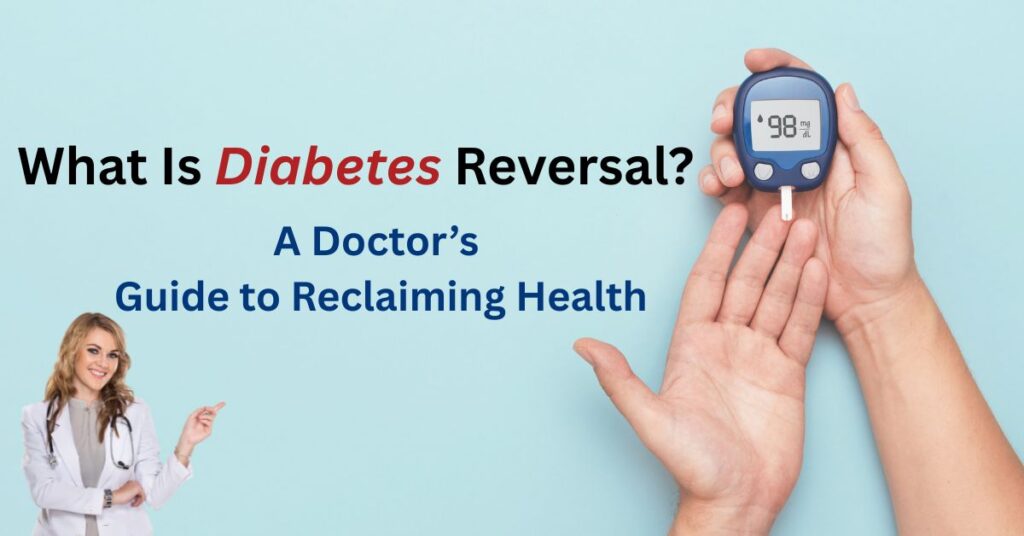
🧠 What Is Diabetes?
Diabetes mellitus is a chronic metabolic disorder characterized by high blood glucose (sugar) levels, either due to insufficient insulin production or the body’s inability to effectively use insulin. Insulin is the hormone that allows glucose to enter your cells to be used for energy.
Types of Diabetes:
Type 1 Diabetes – An autoimmune condition where the immune system destroys insulin-producing beta cells in the pancreas. Usually appears in childhood or adolescence.
Type 2 Diabetes – The most common form, often linked to lifestyle, obesity, and genetics. It results from insulin resistance and eventual insulin deficiency.
Gestational Diabetes – Temporary diabetes occurring during pregnancy, increasing the mother’s risk of developing type 2 diabetes later in life.
📉 Can Diabetes Be Reversed?
Yes, in many cases, type 2 diabetes can be reversed, particularly in its early stages. Reversal means achieving normal blood sugar levels (HbA1c <6.5%) without the need for diabetes medications, achieved through structured lifestyle changes.
Reversal doesn’t imply a cure, but it indicates remission, where your blood sugar remains in a healthy range without ongoing pharmacological treatment.
🔬 The Science Behind Reversal:
Research highlights from clinical trials like the DiRECT Study in the UK, the Virta Health trials in the US, and the Twin Cycle Hypothesis provide robust evidence that:
Losing 10–15% of body weight
Reducing liver and pancreas fat
Improving insulin sensitivity can all lead to significant glycemic improvement and diabetes remission.
🔁 Common Misconceptions
| Myth | Truth |
|---|---|
| “Diabetes is always permanent.” | Many early-stage type 2 cases can be reversed or enter remission. |
| “Only sugar causes diabetes.” | Total lifestyle, stress, poor diet, and inactivity contribute to insulin resistance. |
| “I have no symptoms, so I’m fine.” | Diabetes often develops silently — screenings are crucial. |
| “Once on insulin, always on insulin.” | With guided programs, medications can often be reduced or stopped. |
📊 How Is Diabetes Diagnosed?
A combination of tests can confirm a diagnosis:
Fasting Blood Sugar (FBS): ≥126 mg/dL
Postprandial Blood Sugar (PPBS): ≥200 mg/dL (2 hours after a meal)
HbA1c (Glycated Hemoglobin): ≥6.5% (3-month average)
These values should be assessed with clinical symptoms and repeated for confirmation.
📌 How Can I Prevent or Delay Diabetes?
You can significantly reduce your risk with proactive lifestyle changes:
Maintain a healthy weight (BMI <23)
Avoid sugary drinks and processed carbs
Stay active: brisk walking 30–45 min/day
Sleep 7–8 hours daily, manage stress through mindfulness
Screen annually if overweight or with a family history
🩺 Symptoms to Watch For
Early detection is key. Watch out for:
Frequent urination (polyuria)
Increased thirst (polydipsia)
Unexplained weight loss
Fatigue and irritability
Blurred vision
Delayed wound healing
🧾 Understanding HbA1c & Glucose Targets
| Category | HbA1c | Fasting Sugar | PPBS |
| Normal | <5.7% | 70–99 mg/dL | <140 mg/dL |
| Pre-diabetes | 5.7–6.4% | 100–125 mg/dL | 140–199 mg/dL |
| Diabetes | ≥6.5% | ≥126 mg/dL | ≥200 mg/dL |
🧘 Lifestyle Changes That Matter
Simple daily habits can drive major improvements:
Walk for 10–15 minutes after every main meal to lower post-meal sugar spikes
Include protein with each meal: eggs, lentils, tofu, chicken, etc.
Structured eating: fixed meal timings and no late-night eating
Track your sleep, water intake, and physical activity using a habit tracker
🥗 What Should a Diabetic Diet Look Like?
An ideal plate has:
50% vegetables (cooked and raw)
25% whole grains (millets, brown rice, whole wheat roti)
25% protein (dal, paneer, chicken, eggs)
Avoid:
Refined carbs (white bread, white rice, bakery items)
Sugary drinks and fruit juices
Fried and ultra-processed foods
Preferred snacks:
Roasted chana, nuts, boiled eggs, Greek yogurt, sprouts
Hydration:
Aim for 2.5–3 liters of water/day
👉 Download our structured 1200, 1400, 1600, or 1800 kcal diet plans designed by Dr. Ravi Kiran.
💬 Frequently Asked Questions
1. Can I stop all medicines after reversal?
Not immediately. With consistent effort and lab monitoring, many patients can taper off.
2. Should I avoid fruits completely?
No. Opt for low glycemic index fruits like apple, pear, guava, and berries.
3. Is intermittent fasting safe?
It can be beneficial under medical supervision. Not for pregnant women or those with comorbidities.
4. Can I eat rice?
Yes, in small quantities with fiber and protein. Prefer brown rice or millets.
5. What is HbA1c and why is it important?
It reflects your average sugar over 3 months. It’s a gold standard for monitoring control or reversal.
🤝 Still Have Questions?
We’re here to guide you on every step of your journey. Whether you’re starting, reversing, or maintaining diabetes, knowledge is your strongest medicine.
📞 +91 70135 16394